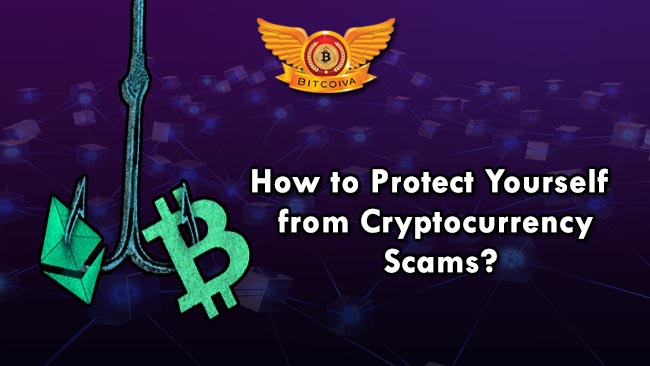How to protect yourself from a crypto scams- The ingenuity of scammers attempting to prey on naive crypto traders and investors has increased along with the popularity of cryptocurrencies worldwide.
But even if you’ve been using cryptocurrency for some time, don’t assume you’re immune from falling for dubious tactics.
Keeping up with the most recent information on cryptocurrency fraud and theft is challenging.
Although cryptocurrency scams are getting more sophisticated, there are ways to prevent falling for one.
Table of Contents
What is a cryptocurrency scams?
There are various types of cryptocurrencies, including well-known ones like Bitcoin and Ethereum and brand-new ones that are continually developing. Scammers will use several tactics to convince you to transmit and buy cryptocurrencies as a payment method or investment opportunity.
Common cryptocurrency scams
Crypto-only transactions
The request for cryptocurrency payment comes from a party that seems trustworthy. They may assert that they don’t accept conventional payment methods, including credit and debit card payments. Due to the difficulty in tracing the money, fraudsters prefer using cryptocurrencies as a payment method.
Investment plans
Fraudsters aim to entice you with phoney bitcoin investment offers. The con artist claims this is a once-in-a-lifetime opportunity, a limited-time request, a highly guaranteed return, or a no-risk opportunity. The con artist will trick you into thinking your investment is doing well, but you’ll never get your money back.
Phishing
Phishing is a technique that fraudsters use to obtain your private key for your digital wallet and take your cryptocurrencies. Then, they send mass emails, hoping you will click the link and share your personal and financial information.
8 Tips to Protect Yourself from Crypto Scams

Here are eight valuable precautions How to protect yourself from a crypto scams you may take to guard against cryptocurrency fraud.
1. Never divulge the seed phrase for your wallet.
It is a fraud to steal your assets if you ask to divulge the seed phrase of your cryptocurrency wallet, partake in an investment opportunity, or “restore” or “load” your account.
Never divulge your private keys or seed phrase to anyone.
And keep in mind to store your seed phrase in a secure location.
2. Conduct independent research.
Do your research if you’re unfamiliar with a cryptocurrency or don’t know what makes it distinct.
Search online for the business and the cryptocurrency, and include the words “review,” “scam,” or “complaint” in your search.
Don’t just skim the information; pay attention to the outcomes. Online reviews can have originated from fictitious profiles.
Before taking a financial risk, conduct your research (DYOR).
3. Ignore urgent inquiries.
Scammers attempt to employ high-pressure techniques to persuade you to submit money right away.
For instance, they might give you a discount or a bonus if you respond immediately. Alternatively, they can pose as a friend who needs money supplied as cryptocurrency in a crisis.
Beware of pushy “Invest now!” sales pitches. It’s most likely a “pump and dump” con.
Urgent payment requests are a serious red flag. Delete the emails and disregard the requests if you get them.
4. Examine social media posts with caution.
Scammers use social media more profitably than any other platform to target people.
Cryptocurrency scammers frequently advertise their schemes through chat apps like Telegram and Discord and social networking sites like Twitter.
They can assert that well-known people or celebrities have invested in or supported their enterprises. Posts might contain images or screenshots. But everything about this is a lie. So do not be fooled by the hype.
Be cautious and DYOR whenever…not if…you notice a new coin or other cryptocurrency initiatives heavily promoted on social media.
Additionally, be wary if someone tries to start a connection or romance with you right away after finding you on social media.
5. Ignore chance DMs.
It’s a fraud if you receive a random direct message (“DM”) from a stranger offering you the chance to invest in cryptocurrency.
Never send anyone who contacts you without your permission any crypto or personal information.
Even if you know the individual and they are not strangers, be wary.
Either that person tricking by a con artist and is now attempting to get you to take part, OR their phone, email, or social media account, and a hacker is posing as your buddy.
6. Confirm that the webpage address is accurate.
Always check the website’s address (“URL”) twice when accessing a crypto-related website before entering any personal data.
Use renowned cryptocurrency price monitoring websites like CoinMarketCap or CoinGecko as well. Just search for that particular cryptocurrency, then look for a link to their official website.
Always check the spelling of the URLs in any links before you click whenever you receive ANY communications, whether by email, text, chat, or direct message! Also, avoid URL redirects, which quietly send you to a new website with a similar layout.
7. Download applications from legitimate mobile app distribution websites.
Use only official mobile app distribution platforms, commonly referred to as “app stores,” when downloading mobile crypto apps.
It is the Apple App Store for iOS devices. It is the Google Play Store for Android smartphones.
I strongly advise avoiding “sideloading,” which is downloading a mobile programme from somewhere other than the App Store or Google Play Store. Neither Apple nor Google have vetted these apps.
For instance, you can install a fraudulent mobile wallet. I will promptly transfer any cryptocurrency you send into this wallet to a wallet that is unquestionably not yours.
Be wary of solicitations to download programmes to fix issues or allow access to your device.
8. Stay away from anything that makes “promises” or “guarantees.”
- Someone is deceiving you if they “promise” high returns.
- Additionally, it is a scam if they “promise” returns.
- But if they guarantee high returns with no risk, that’s legitimate.
- I’m just joking! That’s a fraud, of course!
There are no reliable investments with a risk-free high-return guarantee. A pot of gold at the end of a rainbow is more likely to be found.

warning signs of How to protect yourself from a crypto scams
- promises of free money
- Unspecific information on the use of your investment funds
- Someone you don’t know shares a bitcoin investment opportunity that seems too good to be true.
- You inform that an investment in cryptocurrencies would have no risk and a guaranteed high return.
- A well-known person or social media influencer advertises a bitcoin investment opportunity
Any correspondence you receive, including an unwanted email or social media post, may contain words and grammatical mistakes.
Conclusion:
The scam of money, fraudsters use cryptocurrency schemes. When asked for bitcoin for payment or to invest in a unique opportunity, they assume the identity of reliable people or companies. Find out How to protect yourself from a crypto scams funds and personal information against bitcoin scams.
Also read: Steps To Create A Cryptocurrency Trading App to Guide Basics

